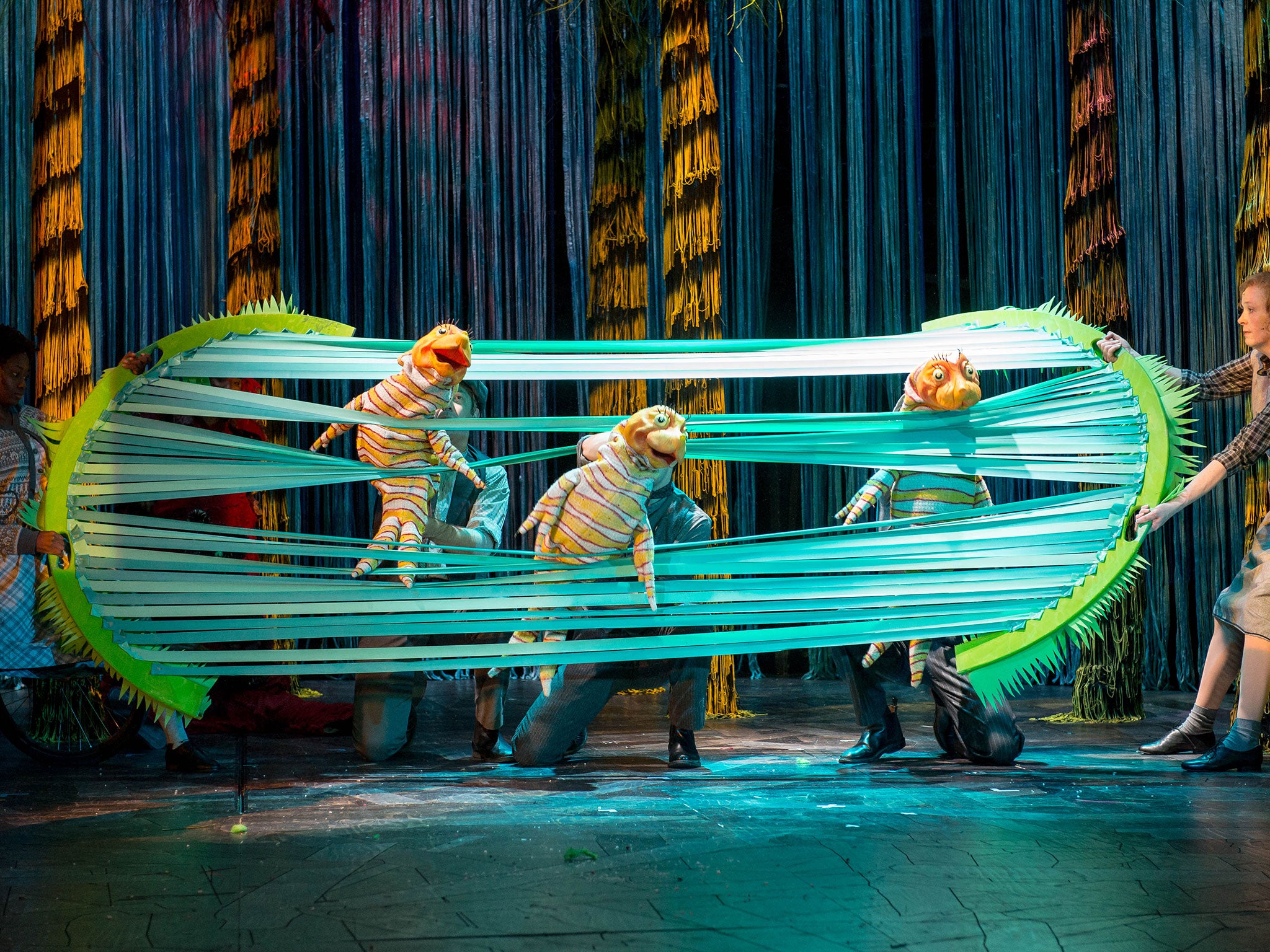Why 'relaxed performances' at theatres are a godsend to parents with toddlers
Going to the theatre with three small children can be relaxing when you don’t have to worry about keeping them quiet

Two fluorescent green eyes glare out of a black stage, prompting the four-year-old next to me to duck behind the seat as The Lorax gets under way.
We are at what is billed as a “relaxed performance” of the Dr Seuss adaptation, at The Old Vic, in London, which means anything goes when it comes to audience noise. But on my own, with three in tow – there’s a 14-month-old on my lap as well as her two brothers, ages seven and four – I wonder what could possibly be relaxing about the experience.
It’s the only show in the The Lorax’s six-week run where children of any age are welcome, although the Old Vic website states that the play is meant for those aged six and over and promises to bar anyone younger. Glancing round the stalls, which is easy to do because the house lights are kept on throughout the performance, I can see that it’s a popular option for families, from newborns up.

I watch a father jiggle a tiny baby in the aisle, silencing her nascent noises with a bottle. Later, Xenofon Kavvadias, an artist from East Dulwich, south London, tells me that bringing three-month-old Eva was the only way he could have managed the outing with his other daughter, Marina, four. “Everyone was very understanding,” he said of Eva’s few squawks.
As a newcomer to the concept of relaxed performances, which started in 2006 as a way to enable anyone who might find staying still and quiet for the duration a challenge, I hadn’t known quite what to expect.
I found that the odd yelp, gurgle, shout, and even bark, from the crowd blended easily into the on-stage action. And although my boys were rapt throughout, it was bliss to know that it didn’t matter if their sister, Etta, wasn’t silent. That said, she was transfixed for the first 45 minutes, and particularly delighted when she spotted that the picture of the Lorax on the programme matched the puppet on stage.
Family-friendly theatre
- 5 January I Believe in Unicorns, (right) Orange Theatre, Richmond, London
- 6 January Cinderella, Richmond Theatre, London; Peter Pan, New Wimbledon Theatre, London; Aladdin, Milton Keynes Theatre
- 7 January Sleeping Beauty, New Victoria Theatre, Woking
- 8 January Snow White, King’s Theatre, Glasgow (above)
- 10 January Nutcracker, The Coliseum, London
- 12 January The Snowman, Theatre Royal, Nottingham; Dick Whittington, Theatre Royal, Newcastle
- 17 January Paper Dolls, Polka Theatre, London
- 19 January Charlie and the Chocolate Factory, Theatre Royal, London
And when she wanted to stretch her legs, toddling up and down the aisle for the final 15 minutes of the first half, she could. I did wonder if she might have disturbed the man behind us, but David Brooksbank, 69, there with his daughter Claire and grandchildren, insisted Etta’s vocal participation was “wonderful, wonderful. That was the whole point of it”.
The actors didn’t miss a beat, or mess up a single rhyme. Speaking in his dressing room afterwards, Simon Paisley Day, who plays the Once-ler, said: “It was exciting to do it in a slightly different way and to get a bit more feedback. It just makes it live and breathe.”
The key, he added, was knowing to expect some noise. “A few weeks ago, someone was shouting up in the dress circle. It was in the middle of one of my speeches, and I was going, ‘OK, what is this? Is there a bomb?’ ... But we knew today, so it’s fine, and you keep going regardless. It makes you concentrate even harder.”
It was the first time Simon Lipkin, who voiced the Lorax, had played to a “relaxed” crowd; he found it “beautiful”. As a plus, he chatted to a lady in the interval who had brought 25 children who had never been to the theatre before: “They were mesmerised. That’s the next generation of theatregoers, which I think is a pretty special thing.”
Theatres make a loss from putting on relaxed shows because a greater proportion of tickets are concessions, plus they leave the auditorium at least a quarter empty to give groups their own space. There are extra ushers to pay, plus everyone needs extra training beforehand. “It all adds up,” says Kate Varah, executive director of The Old Vic. The Lorax was only the venue’s second relaxed performance, but she hopes more will follow.
It turns out that going to the theatre solo with three small children can be strangely relaxing – but only when you don’t have to worry about keeping them still or quiet.
Join our commenting forum
Join thought-provoking conversations, follow other Independent readers and see their replies
Comments
Bookmark popover
Removed from bookmarks